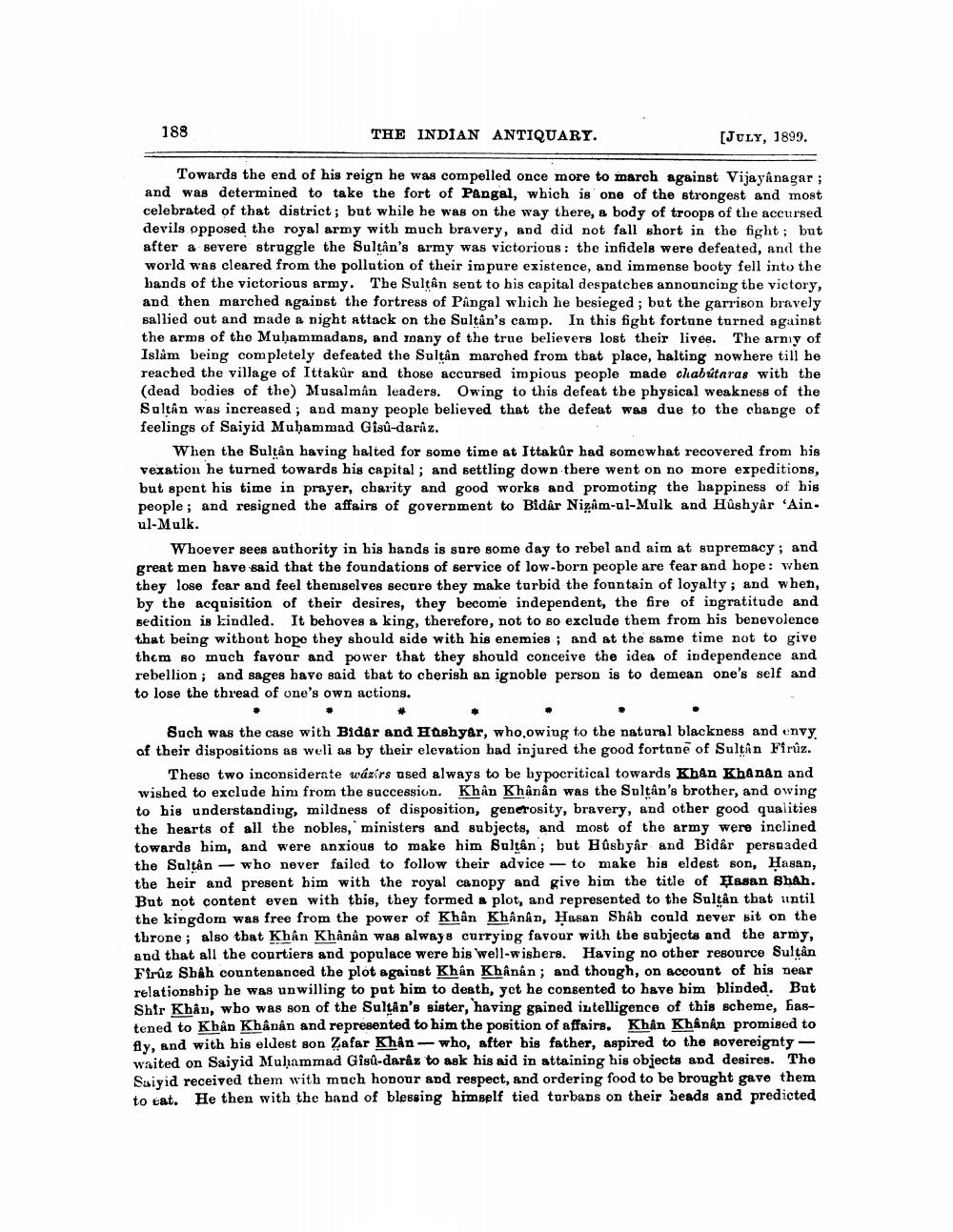________________
188
THE INDIAN ANTIQUARY.
[JULY, 1899.
Towards the end of his reign he was compelled once more to march against Vijayanagar ; and was determined to take the fort of Pangal, which is one of the strongest and most celebrated of that district; but while he was on the way there, a body of troops of the accursed devils opposed the royal army with much bravery, and did not fall short in the fight; but after a severe struggle the Sultan's army was victorious: the infidels were defeated, and the world was cleared from the pollution of their impure existence, and immense booty fell into the hands of the victorious army. The Sultan sent to his capital despatches announcing the victory, and then marched against the fortress of Pangal which he besieged; but the garrison bravely sallied out and made a night attack on the Sultan's camp. In this fight fortune turned against the arms of tho Muhammadans, and many of the true believers lost their lives. The army of Islam being completely defeated the Sultân marched from that place, halting nowhere till he reached the village of Ittakür and those accursed impious people made chabútaras with the (dead bodies of the) Musalman leaders. Owing to this defeat the physical weakness of the Soltan was increased ; and many people believed that the defeat was due to the change of feelings of Saiyid Muhammad Gisů-dariz.
When the Sultan having halted for some time at Ittakûr had somewhat recovered from his vexation he turned towards his capital; and settling down there went on no more expeditions, but spent his time in prayer, charity and good works and promoting the happiness of his people; and resigned the affairs of government to Bidar Nizam-al-Mulk and Hůshyâr 'Ain. ul-Mulk.
Whoever sees authority in his hands is sure some day to rebel and aim at supremacy; and great men have said that the foundations of service of low-born people are fear and hope: when they lose fear and feel themselves secure they make tarbid the fountain of loyalty; and when, by the acquisition of their desires, they become independent, the fire of ingratitude and sedition is kindled. It behoves a king, therefore, not to so exclude them from his benevolence that being without hope they should side with his enemies ; and at the same time not to give them so much favour and power that they should conceive the idea of independence and rebellion; and sages have said that to cherish an ignoble person is to demean one's self and to lose the thread of one's own actions.
Such was the case with Bidar and Hashyar, who owing to the natural blackness and envy, of their dispositions as well as by their elevation had injured the good fortune of Sultan Firüz.
These two inconsiderate wázírs used always to be bypocritical towards Khan Khanån and wished to exclude him from the succession. Khân Khânån was the Sultan's brother, and owing to his understanding, mildness of disposition, generosity, bravery, and other good qualities the hearts of all the nobles, ministers and subjects, and most of the army were inclined towards him, and were anxious to make him Sultan; but Husbyar and Bidâr persuaded the Sultan - who never failed to follow their advice to make his eldest son, Wasan, the heir and present him with the royal canopy and give him the title of lasan Shah, But not content even with this, they formed a plot, and represented to the Sultan that until the kingdom was free from the power of Khân Khânân, Hasan Shab could never sit on the tbrone ; also that Khân Khânån was always currying favour with the subjects and the army, and that all the courtiers and populace were his well-wishers. Having no other resource Sultan Firuz Shah countenanced the plot against Khân Khânân; and thongh, on account of his near relationship he was unwilling to put him to death, yet he consented to have him blinded. But Shir Khân, who was son of the Sultan's sister, having gained intelligence of this scheme, hastened to Khân Khânân and represented to him the position of affairs. Khân Khanan promised to fly, and with his eldest son Zafar Khan - who, after his father, aspired to the sovereignty - waited on Saiyid Muhammad Gisů-daraz to ask his aid in attaining his objects and desires. The Saiyid received them with much honour and respect, and ordering food to be brought gave them to eat. He then with the hand of blessing himself tied turbans on their heads and predicted




